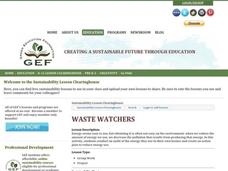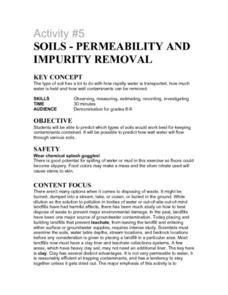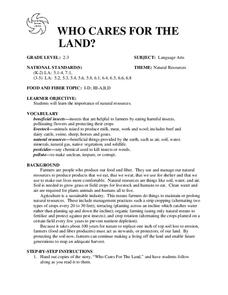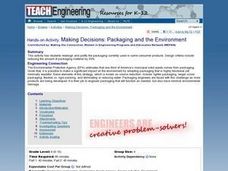Curated OER
Fossil Fuels: Facing the Issues
Young scholars explore energy by researching fuel usage on Earth. In this fossil fuel lesson, students define fossil fuels, the energy created by burning them, and the impact on the environment when using them. Young scholars conduct...
Curated OER
Waste Watchers
Energy-aware learners conduct an audit on their electricity usage by recording their electric meter reading and assessing the thermostat, light bulbs, windows, and water heaters in their homes. In class, they analyze results and discuss...
Curated OER
Phytoremediation
Students participate in a lab designed to facilitate the clean up and remove of substances ranging from heavy metals to dynamite. They focus on the remediation of copper. They discuss their results of this open ended inquiry experiment.
Curated OER
Evaporation and Condensation
Students explore how temperature affects the processes of evaporation and condensation.
Curated OER
Environmental Responsibility
Young scholars discuss the importance of recycling and preventing pollution. In groups, they complete mini-studies on various environmental issues and evaluate different consumer products. They use global warming data to determine the...
Illinois Department of Natural Resources
Section Four: How Can We Protect Biodiversity?
Look into the future with a lesson plan on biodiversity and natural habitats. Learners read articles about different perspectives when it comes to planning future development, and decide which angle is the highest priority in a group...
Curated OER
Activity #5 Soils-Permeability and Impurity Removal
Middle schoolers predict which types of soils would work best for keeping contaminants contained. They comprehend that in the past, landfills have been one major source of groundwater contamination. Pupils comprehend that placing and...
Curated OER
Oily Oceans
Students, after reading Jack, the Seal and the Sea, by Gerald Aschenbrenner, get a hands-on knowledge of the effects of oil on water, and those things that come in contact with it.
Curated OER
Pea Soup Ponds
Young scholars perform an experiment where they learn how water can be polluted by algal bloom. They grow algae with different concentrations of fertilizers or nutrients and analyze their results.
Curated OER
Dripping Wet or Dry as a Bone?
Students use a sponge and water model to explore the concept of relative humidity and create a percent scale. They define humidity and saturation, build a simple humidity/saturation model, collect, predict and interpret data, and create...
Curated OER
What is an Aquifer?
Students examine how an aquifer operates. They discuss the implications of the groundwater becoming contaminated. They work together to create an aquifer model to observe the connection between surface water and groundwater.
Curated OER
WHO CARES FOR THE LAND?
Students explore the importance of natural resources. They are given copies of the story, "Who Cares For The Land," and students follow
along as the teacher reads it. Students identify the key points in the story. (Soil, water and air...
Curated OER
Sustainable Island Development
Students explain how the basic human needs of a large group of people can be met. They describe and evaluate alternative methods for providing water and food, producing electricity, handling wastes, and transporting goods and people....
Curated OER
Sustainable Island Development
Learners explain how the basic human needs of a large group of people can be met. They describe and evaluate alternative methods for providing water and food, producing electricity, handling wastes, and transporting goods and people....
Curated OER
Chromatography - Chemical Separation of Colors
Third graders use the scientific method as they separate the colors used in ink. In this chromatography lesson, the teacher introduces students to how chromatography is used in several careers, then students perform an experiment to see...
Curated OER
Making Recycled Paper
Students explore the advantages of recycling paper. In this environmental lesson, students produce recycled paper by ripping up paper and putting it into a blender with water to create a mixture. Students use their recycled paper to...
Curated OER
Fishing for Solutions
Students investigate the many ecological and economic issues related to over fishing the world's marine resources. Working in committees, students research the related topics of equipment and fishing techniques.
Curated OER
Making Decisions: Packaging and the Environment
Learners work in small groups to redesign the packaging of several common items. They attempt to reach the goal of 25% reduction in packaging materials currently used and explore the impact of various materials and designs in landfills...
Curated OER
WHAT'S ORGANIC?
Students explore how certain foods come to be certified "organic." They write the words "organic" and "synthetic" and given the definitions of each. Students are given dictionaries. They are asked: "What is organic food?" Students grow...
Curated OER
Desalination: Creating a Solar Still
To better understand how solar power can aid in creating desalinated drinking water, the class creates a model still. They will build a model of a solar still, make observations, and discuss how the process works. While the idea behind...
Curated OER
Does the Introduction of Pesticides and Fertilizers Alter an Aquatic Ecosystem?
Learners conduct an experiment using a small sample from a local water source. They introduce fertilizers and pesticides, separately, and carefully examine the results in their simulated aquatic ecosystem.
Science Matters
That’s An Otter Story
Young scientists discover how sea otters' habitats have changed due to human impact. Through conversation, video observation, and story reading, scholars identify how human interactions change a specific ecosystem in both positive and...
Colorado State University
What Is a "Model"?
Model the transfer of energy during a typical 24-hour period. Young scholars use a game-like approach to learning the patterns of heat transfer through the day and night. Groups of four exchange different tokens as the energy transfers...
Curated OER
Getting the "Yuck" Out
Students examine various types of household materials for their usefulness as filters. They work together in teams to design a filtration system that produces the cleanest water in the shortest time.

























